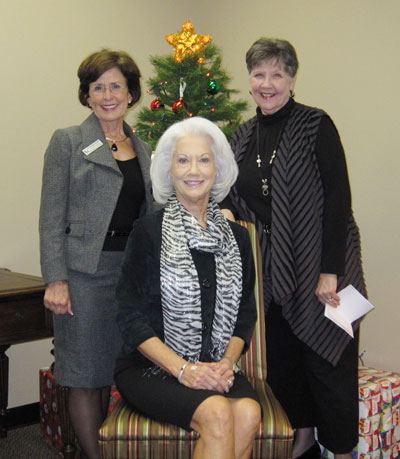College Receives NCATE Accreditation Renewal
Dec. 2, 2010
SHSU Media Contact: Jennifer Gauntt
 |
| Christmas came early for the College of Education when they received word last month that the college had been reaccredited by the National Council for the Accreditation of Teacer Education through 2015. The process was led, in part, by accreditation coordinator Marilyn Butler, COE Dean Genevieve Brown and associate dean Karen Smith. |
While teacher education programs across the country have recently taken hits in the press, Sam Houston State University’s College of Education has been addressing for years many of the issues that are just now being brought to light, according to Marilyn Butler, COE accreditation coordinator.
Recent articles in the Houston Chronicle and Wall Street Journal have criticized teacher education programs across the country, claiming that student teachers are poorly prepared to enter the workforce as a result of preparation programs. Among the complaints are that students aren’t provided with critical thinking, communication and collaboration skills.
Stephanie Banchero’s Nov. 16 Wall Street Journal article, “Teacher Training Is Panned,” refers to a Blue Ribbon Panel report which she said “called for an overhaul of U.S. teacher-preparation programs, including a greater emphasis on classroom training as well as tougher admission and graduation standards for those hoping to teach in elementary and secondary classrooms.”
But Butler says SHSU’s College of Education has already anticipated those issues, as evidenced not only by their National Council for the Accreditation of Teacher Education’s “nationally recognized” full accreditation but by its training style, in place for a number of years.
NCATE is recognized by the U.S. Department of Education and highly acclaimed nationally as an accrediting body for institutions that prepare educators for professional roles in schools.
“These things are all part of the program: to be able to collaborate, communicate effectively and produce problem-solving skills. NCATE accreditation responds to that,” Butler said. “We hold the distinction of being one of the institutions that has been NCATE accreditation since its inception (in 1954).”
The college received word that its accreditation by the organization had been renewed through 2015 last month.
“NCATE’s mission is to provide accountability and improvement in teacher preparation through a standards-based assessment system with the goal of encouraging accredited institutions to employ continuous improvement, founded on accurate and consistent data,” Butler said.
Of Texas’ 38 public four-year universities, only 12 have NCATE accredited education programs. Within the Texas State University System, only SHSU and Lamar are accredited by NCATE.
“NCATE’s standards provide assurance that SHSU candidates are engaged in a rigorous process to prepare them for a career in teaching,” said College of Education Dean Genevieve Brown. "The process is rich with knowledge, skills, dispositions and field experience through an integrated curriculum that establishes a systematic preparation program in which the candidate transitions from classroom to methods to student teaching.”
The accreditation process is both comprehensive and multi-layered. The process takes approximately three years to receive the seven-year approval, which SHSU received for both its advanced (master’s and doctoral) and initial (undergraduate and post-baccalaureate) programs.
“There are six standards that must be satisfied in order to receive accreditation,” said Karen Smith, associate dean of undergraduate programs and assessment for the college. “That standard is like the gold standard of education because it ensures the college, the unit, has met this whole set of standards.”
One of the “sweeping recommendations” suggested within Banchero’s WSJ article was to “urge teacher-training programs to operate more like medical schools, which rely heavily on clinical experience.”
This, too, is something that SHSU has already had this style of instruction in place for years, according to Smith.
Student teachers receive supervision, coaching and instruction by “experienced educators that include mentor teachers, university supervisors, focused-content supervisors, and university instructors,” Smith said.
“Our candidates are observed on a regular basis and their effect on P-12 student learning is comprehensively evaluated,” she said. “They are in a setting like a hospital residency where they have all these layers of people who equip them to be teachers.”
This can also be seen through the role SHSU’s 40 partner schools played in the college’s recent reaccreditation.
The six-person NCATE board of examiners, who visited the SHSU campus in October 2009 for its routine on-site observations, not only travelled to some of SHSU’s partner schools but many of those partners came to campus to meet with the team.
When SHSU’s College of Education comes up for reaccreditation again in 2015, the approval will come from the Council for the Accreditation of Educator Preparation, which was created this year with NCATE and the Teacher Education Accreditation Council, the nation’s two major accrediting bodies, consolidated this year.
To see the complete list of current NCATE-accredited Texas universities, visit
http://www.ncate.org/StatebyStateListofAccreditedInstitutions/tabid/539/Default.aspx.
- END -
This page maintained by SHSU's Communications Office
Director: Bruce Erickson
Assistant Director: Julia May
Writer: Jennifer Gauntt
Located in the 115 Administration Building
Telephone: 936.294.1836; Fax: 936.294.1834
Please send comments, corrections, news tips to Today@Sam.edu.

 SamWeb
SamWeb My Sam
My Sam E-mail
E-mail

